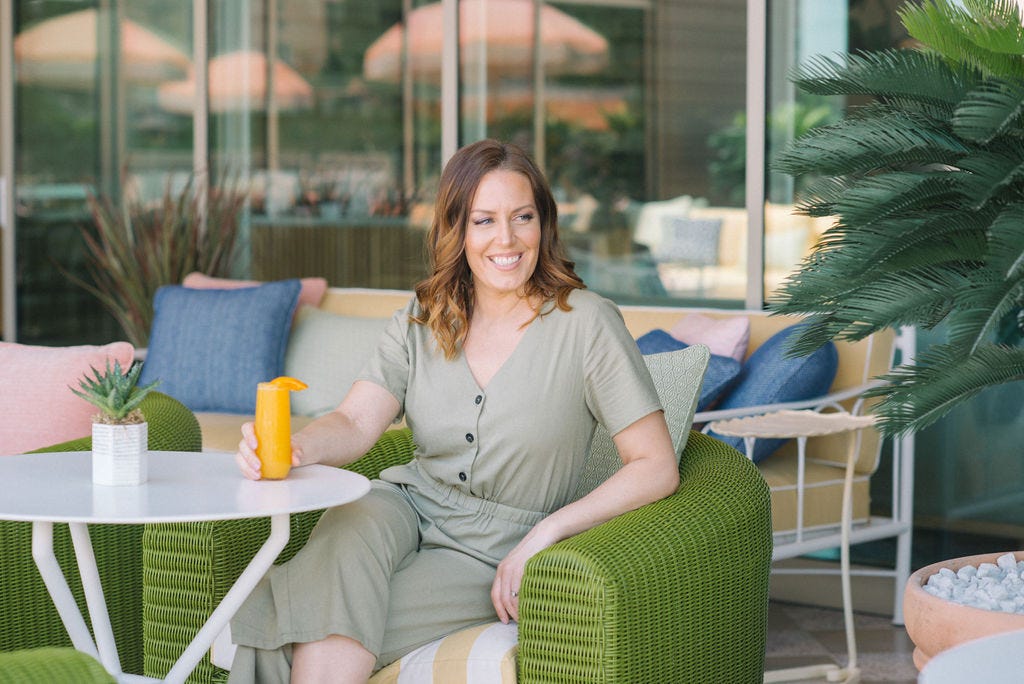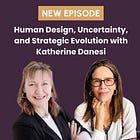Meet Nicole Swartz, Trademark Attorney & Founder, Sprout Law
"It's probably the same mistake that I made, which is waiting too long to trademark their brand."
I love being in conversation with other awesome female founders. There’s so much to learn from their stories. Here’s the third in a series of interviews with women business owners who are identifying problems, seizing opportunities, and changing the way things are done in their industries. I hope you love them as much as I do.
Nicole Swartz is a trademark attorney and founder. In 2015, she started a beauty brand that was sold in hundreds of retailers around the world. But there was one BIG problem…
She didn’t trademark her brand. One day, she woke up to a cease + desist letter in her inbox. Someone trademarked her brand name and now they owned it. She had to rebrand everything in 30 days. A total nightmare! Nicole became a trademark attorney to help other female founders own their brands. Today, she runs one of the top 3 trademark law firms in the U.S. She's filed over 1,200 trademarks with a 99.8% success rate.
1. I'd love to start with your backstory - how did you end up pursuing law as your chosen career?
It was one of those things where everyone in your life tells you, “you should be a lawyer, you should be a lawyer, you should be a lawyer.” And then you just become a lawyer. It's like everyone manifested it for me.
When I was thinking about going to law school, I've always been really concerned about fairness and justice and accessibility. So that was what I went into law wanting to do. And what I didn't realize about law is that it's so specialized.
So you go into law and they're like, great, but what specific niche do you want to do? And that's the part that took me a minute to figure that piece out.
Originally, I was pursuing securities law, which is not concerned with justice and accessibility, and any of those things. That’s also why I got burned out. I didn't work there very long. I knew it was clearly not going to be a long-term fit for me. And I was looking for a way out of it.
And I was also really questioning the law. I didn't know if there's a way for me to do what aligned with the work on accessibility and fairness and justice. But I focused a lot on business law. And so I was struggling to kind of figure out how could I merge those two things. Then…
It was just one of those middle-of-the-night epiphanies sometimes where I can't sleep. And I'm like, oh, this thing. I was just scrolling Pinterest and I found a recipe for a beauty product formula. And I was just like, okay, I'll sell that. Whatever, I don't care. It's just something to not do securities law anymore. So that was really how it started as a CPG brand, knowing I can't go to this nine-to-five and do this work anymore.
2. Did the CPG brand start as a side hustle? And how did it evolve.
I started as a side hustle. I still had my full-time job for a long time. I started selling it at festivals and small events and stuff like that. And then I started actually making money with it. And I was like, oh, wow, okay. I didn't really see that coming.
Then I started going into stores… just walking into stores and saying, hello, would you like to sell my product? And people would say yes. And I'd be like, wow, okay, really? So it just kind of built from there. Then we went to trade shows. And then we got a couple hundred stores. And then we were in more.
At a certain point it was just like, okay, well, now my income from the CPG brand is the same as my law job. But that felt like, to me, this was the time when I was like, okay, I feel safe to go ahead and switch.
I was doing both for a year and a half. So I was running this business on nights and weekends.
3. How and why did you decide to launch Sprout Law?
It's a very funny story. So I was running this CPG brand. It was a beauty business and I didn't trademark it. It was the last thing on my mind, because I was walking into stores. I was going to trade shows.
Because I was doing all the stuff. And then I woke up one morning and had a cease and desist letter in my inbox. And I was like, what? This is a joke, right? So I hired a trademark attorney and I said tell me this isn't real. They said no, this is very real. And you have to change your name. Someone has trademarked this brand before you and they now own it.
And you're no longer allowed to use it and you need to come up with a new name. The letter said 30 days. The attorney said we can get you 90. And I said, I can't do anything with 90, but they were like, that's all you can get.
So, I had to rebrand everything and literally contact stores and say, I know you've got a bunch of products that have this old brand on them. I will pay you to send the new products with the new brand. But you can't sell what’s on the shelf anymore. That's obviously really embarrassing to call and say that.. Luckily everyone was super nice about it, but it wasn't like the best look. Then the reality is it took so much of my focus.
Because I had been really focused on how do we get more stores? How do we get more retailers? And how do we scale to the next level? I couldn't do that because I had to pause everything and be like, okay, well, now we need a new brand. And now we need a new domain. And now we need new business cards. And now we need new photos. And we need new packaging. We couldn't grow the business for a long time because we had to focus on this.
As a result, I became obsessed with trademarks. I was back to this justice, fairness thing again. I just was like, no one's talking about this. And so I became obsessed with it. I was talking to all my friends – I'm sure you know, you experience this, when you run a business, all your friends also run businesses – you just find each other. So I was talking with a lot of my friends. And they said, we don't know anything about trademarks.
This was probably eight years ago and nobody was really talking about it. And I met with one of my friends who's a guy who runs a startup. And he told me, oh yeah, we have 12 trademarks and eight patents. And meanwhile, my 30 women friends were in the dark.
I knew that there was a big education gap here that, for whatever reason, women aren't talking about it as much. And that just became like a cool way to have an impact, so I started helping my friends do it on the side – they're like, oh, can you help me with mine?
Luckily, my friends trusted me because I had read everything about trademarks, but I'd never done any before. So, I started doing that and found this is actually like a really cool way to kind of merge what I was talking about – how to merge business and law and, you know, caring about accessibility and getting to work with women founders who were my friends.
And I realized this actually brings together a lot of the things I care about and that I kind of stumbled into it accidentally.
4. Who's your sweet spot client? When, why, and how do they come to you?
It’s kind of a mix. We work with people in any industry – from like electric cars to like dead bugs to AI, but most of our clients probably have a product, whether that's beauty or candles or apparel, to a stationery, retail shop, etc. – so roughly 50% are products, 50% are services.
They're wellness brands or a speech language pathologist, a travel agent, or someone who has a course about parenting, personal development, coaches, I could go on. My sweet spot founder is probably somebody there. They are women founders who are releasing something into the world that they really care about. Working with them is our main goal.
And almost everybody comes through referrals. And I would say most of them are pre-launch, but there's a good amount of them that have already started.
The good news is I see more people in the space coming to us, already knowing what trademarks are and already like talking about it. When I used to go to conferences in the very beginning, I was the only trademark attorney there. And now I go to conferences, there's three or four other trademark attorneys. And it feels like people are talking about it and it's cool.
5. What are the biggest mistakes you see women business owners make when it comes to protecting their brands?
It's probably the same mistake that I made, which is waiting too long to trademark their brand. I get it – there's a million things on your to do list. It's the thing that’s always on the list. And then you're always like, “Okay, well, yeah, we'll come back to that.”
That's the biggest mistake, because it really matters in terms of talking about trademarks, because we’re talking about who owns your brand. And from the trademark office perspective, they just care about who filed the application first. That's what they look at.
So it's the biggest mistake we see… people who say, “I'll file it later,” and then somebody else beats them to it. As in my case, that often costs you your brand, which is crazy.
In terms of name, trademarking a name, versus trademarking a logo or a certain set of marks, do you see founders get hung up there?
That part of it is tricky. I think that is the biggest misunderstanding, which is that a name is one trademark, and then a logo design is another trademark. And a tagline is another trademark, and a product name is another trademark. You can trademark all of them, but they're all separate trademarks, which just means extra money that you're paying for all of those things.
Usually the name is what I would recommend. That's the strongest thing you can do. Almost everybody that we trademark is trademarking their name. And then I would say maybe 10, 15, 20% of people are trademarking a logo as well – a specific design that they don't think is going to change for a long time. It's very specific to that one design.
6. What are you working on now? How is your role evolving? What has you excited?
We are at a really exciting place where we're at capacity in terms of what we can currently handle. With our team, with our systems, with our CRM, all of it. So that’s causing us to scale up in an exciting way and really dig into what our org chart looks like, and adding a level of business structure to the law firm that we didn't really have before.
And so my role is evolving more of a CEO and now I'm not really in the legal work as much. I still am in it a bit, but my role is changing to be more of managing relationships and the setting direction of the team culture, and making sure that the team's happy and those types of things, which is new for me.
I'm excited about it, but it's weird. Sometimes I'm like, is this a real job? I can't tell. And at the same time, I know that it is because the business needs it. To me, I'm very much a service provider. So if I'm in the day-to-day talking with clients and filing stuff, it's like, I know that's a real job. But this level of being a business owner, I'm still feeling my way around, well, what does that look like day-to-day? What is the job really? That's something that’s a little squishy to me right now.
Right now, our biggest challenge is our systems. We had systems that worked for six years of the business and I was really hesitant to grow. I was really like, “I want to be client-facing. I want to work with my clients. I don't really want to outsource that.” And I wouldn't let anybody take that from me. Then it got to a point where I knew it was just more than I could handle. And we would have to start telling people we couldn't work with them. So we had to grow.
And the systems that worked when it was just me, they don't work when it's everyone. It showed up in things like, how does the team that runs search results know what the other team is saying? Our systems weren't set up for that. Or how do we know across 1,200 clients what our deadlines are? We don't have an easy way to track that. We’re currently using Trello. And it's not exactly what we need.
So, we're trying to figure out what that next stage looks like. And our team is really good about reminding me – this is this level we’re at, but is this scalable too for the next level? How do we bring that into it? And think about what the business is going to grow into and what's going to work now and in the future.
In terms of your shifting from being the person doing the work to the CEO role, I imagine there's some resistance and discomfort there.
There's a lot of mindset challenges that I've had to work through and that I'm also still working through… things like I feel like I'm not qualified to be anyone's boss. Like I'm lucky that our team is working with us, not the other way around.
And also learning to have tough conversations with people when you feel like this isn't really working out. So, it's a role that I'm growing into. I feel like a business education would have served me well.
7. What do you wish you knew when you were starting Sprout Law that you know today)??
I was really stuck on “nobody's going to be able to do these things as well as me.” I didn't want to let go of the legal work for six years because I was like, no, I'm one of the best trademark attorneys in the country and nobody's going to do it like me.” And then I found somebody who does it better than me, you know? And then I said, “nobody can do the social media like me.” And then I found somebody who does it better than me.
Nobody can answer client emails. But I have a certain skill set that not everybody can do too, of running the business and having the idea and executing it. But with all of these little pieces that I thought I would never be able to find anybody. It's good with me.
The reality is there's people out there who do it better than you. And who are excited. And yeah, I wasn't super excited to be answering admin emails. So I would answer them and just be really like, oh, this is kind of annoying. But my team is… they're excited. And so they're able to show up in a way that I wasn't because I've been answering the same questions for six years.
Oh my gosh, six years answering the same question? How do I wrap my head around this? And the team's like, I'd love to answer that. I'm like, really? Okay. So it's just that – people who have better attitudes are just better skilled at doing things.
That’s the thing that I wish [I knew sooner]. And I feel like I hear a lot of people saying the same thing, “I just don't trust anyone to do it.” Or. “I just don't want to outsource because I just don't think I could find somebody to do it like me.” When the truth is, if you find the right person, there's somebody who's better than you at almost everything.
Exactly. Except those things that you can do in your business, right?
100%. And defining what those are is a process. And it's always evolving too. It's like, what is it that I'm good at? And what is it that the business needs me to do? Right now in this moment?
8. At this point, almost 8 years in, what do you think makes a service-based business successful?
I think it's like constantly evolving to the next level. I heard somebody say before, and maybe this is a common thing, but you should try to give away your job every 90 days.
You should be trying personally to get to that next level of like skill or moving on to a different thing. And so to me, it's the systems, how do we have a system where I'm building something for 90 days, that’s not a one-time thing. My 90 days of working on a project is building out a system that I can show somebody else how to do.
Up until like two years ago, I didn't have a single system written down. I don't even know how that's possible. But now, I know it’s helpful to have this – this is how we do this thing. And then I can show other people and we all do it the same way. It’s almost like a little franchise model of like, this is our system of how we do things that we can just like give to the team.
What was that breaking point for you?
I think it was growth. So we had a whole bunch of clients who wanted to work with us. It's a good problem to have. Champagne problems. I'm not complaining about that. But me being the only lawyer for that took a lot of time. I was working nights and weekends and I started to get burned out and I started to get a little bit resentful, which is also just like what a beautiful gift to have so many people want to work with you and to be able to help so many people.
I knew this isn't the way that I should be feeling about it. And just feeling how do I get into a place of like happiness and gratitude with it and what about my day needs to change to get there? I need my nights and weekends back and spending time with my family, that kind of thing.
So, well, what can you do to get there? You can either tell people no and not work with them. And that feels not super aligned with the mission because now there's a bunch of women entrepreneurs that don't have a place that they feel comfortable to go to.
Or you can just get over your own mind stuff and go find somebody and train them on how you do things your way. And, you know, and that's honestly something that I was really afraid of, of working with the team. I want to work by myself. That's why I'm an entrepreneur. And that was kind of my mindset about it. So now, the best part of my week is our team meetings. I love everyone on the team. It’s so fun to work with them. It’s been a big shift for me to change that.
I think it was just like feeling burned out and just feeling like I've hit the end of what I can do by myself.
What was your first hire? Was it another attorney or an assistant?
Another attorney was the last person that I hired because I was just so nervous about hiring an attorney. I just felt like I don't love working with other attorneys. You know, we can be. I'm married to one, so I know how we can be.
So my first hire was an admin, somebody to help with the docketing and client emails and things like that. And then it was paralegals. And then it was social media.
And now we have three attorneys and myself. But that was the last thing that I hired because I had this preconceived notion in my head that we wouldn't get along. And now, truly the best part of my day is these meetings that we have with everyone.
Learn more about Nicole and Sprout Law in these online spaces:
And in case you’re wondering about the story behind the name…
Sprout Law comes from… “We're working with women entrepreneurs and I wanted something that spoke to a kind of feminine energy. And plants to me felt very nurturing. I'm a woman, I love plants, my friends love plants. So it felt like I wanted to be plant related. It also felt like a double meaning because we're helping the businesses grow. And I wanted something related to that."
#ICYMI








